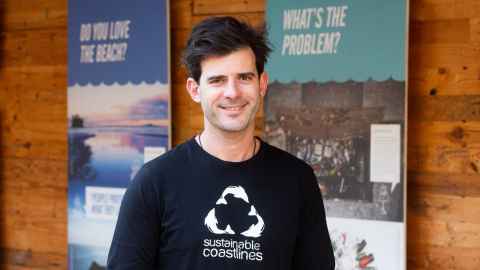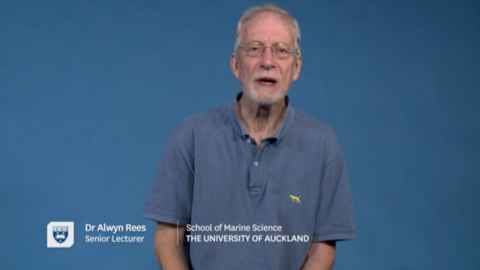Programme overview
The Master of Marine Conservation focuses on complex issues that characterise the management and conservation of the marine environment.
Marine Protected Areas (MPAs) are increasing in number and size. This increase responds to intensifying pressures on our oceans and the need to provide more robust guardianship of marine ecosystems. Protected by law, MPAs require skilled scientists and environmental managers from diverse backgrounds to advocate for, design, monitor and protect them.
The MMarineCons is developed and taught in partnership with Conservation International (CI) and provides essential skills for people looking for careers in MPA research and management, and marine conservation more generally.
If you are already working in this exciting field, or you want make an impact in the marine conservation world, the MMarineCons will give you the opportunity to upskill, expand your knowledge, and gain research experience. The programme also provides learning and hands-on experience in policy and strategic management and will benefit graduates from other disciplines wanting to work in marine conservation.
This programme is primarily taught at the City Campus with some classes and courses taught at the Leigh Marine Laboratory.
Programme structure
The MMarineCons is a 180 point research or taught masters programme that can be completed over three semesters full-time, with part-time options available.
This programme includes a mixture of core courses and elective courses on topics related to marine conservation – such as marine ecology and biology, conservation biology, environmental science, social science, environmental management and policy.
Explore the full programme structure for the Master of Marine Conservation 180 point Research or Taught Masters in the Curriculum Catalogue.
You'll also need to meet other requirements, including time limits and total points limits. See Postgraduate enrolment.
2026 entry requirements
My highest qualification is from:
Programme requirements
Minimum programme requirements
Minimum requirements listed here are the likely grades required and do not guarantee entry. We assess each application individually and applicants may require a higher grade to be offered a place.
-
Study optionTaught 180 pointsGrade requiredGPA Grade Point Average 4.0
-
Study optionResearch 180 pointsGrade requiredGPA Grade Point Average 4.0
Further programme requirements
Select your study option:
You must have completed either:
- A Bachelor of Science degree from this university, with a GPA of 4.0 or higher in 60 points above Stage II.
OR
- An undergraduate degree and have passed 60 points toward the Postgraduate Diploma in Science with a GPA of 4.0 in a relevant specialisation (provided the postgraduate diploma has not been awarded).
You must have completed either:
A Bachelor of Science degree from this university, with a GPA of 4.0 or higher in 60 points above Stage II.
OR
An undergraduate degree and have passed 60 points toward the Postgraduate Diploma in Science with a GPA of 4.0 in a relevant specialisation (provided the postgraduate diploma has not been awarded).
Other pathways to study
If you do not meet the above entry requirements, but have other relevant experience and think you would be successful in postgraduate study, please contact us to discuss alternative pathways into our programmes.
Programme requirements
Minimum programme requirements
Minimum requirements listed here are the likely grades required and do not guarantee entry. We assess each application individually and applicants may require a higher grade to be offered a place.
-
Study optionTaught 180 pointsGrade requiredGPE Grade Point Equivalent 4.0
-
Study optionResearch 180 pointsGrade requiredGPE Grade Point Equivalent 4.0
-
QualificationIELTS Academic International English Language Testing SystemScore required6.5
No bands below 6.0
Further programme requirements
Select your study option:
You must have completed either:
- A Bachelor of Science degree from this university, with a GPE of 4.0 or higher in 75 points above Stage II. Including at least 45 points in a relevant subject such as Environmental Management, Environmental Science, Biology, BioScience, Marine Science or similar.
OR
- An undergraduate degree with a GPE of 4.0 or higher in 75 points above Stage II, and at least three-years of relevant professional experience.
OR
- An undergraduate degree in the same field as your intended specialisation at a recognised university (or similar institution) with a GPE of 4.0 or higher.
You must have completed either:
- A Bachelor of Science degree from this university, with a GPE of 4.0 or higher in 75 points above Stage II. Including at least 45 points in a relevant subject such as Environmental Management, Environmental Science, Biology, BioScience, Marine Science or similar.
OR
- An undergraduate degree with a GPE of 4.0 or higher in 75 points above Stage II, and at least three-years of relevant professional experience.
OR
- An undergraduate degree in the same field as your intended specialisation at a recognised university (or similar institution) with a GPE of 4.0 or higher.
How much does a Master of Marine Conservation cost per year?
2026 fees
- Domestic students
- NZ$10,618.80 – $11,545.20*
- International students
- NZ$55,484*
Fees are set in advance of each calendar year and will be updated on this website. Fees are inclusive of 15% GST, but do not include the Student Services Fee, course books, travel and health insurance, or living costs. Amounts shown are indicative only. In addition to the tuition fees, there is a Student Services Fee of $9.44 per point, estimated at $1,699.20 for full-time study (180 points). Fees will be confirmed upon completion of enrolment into courses.
*Please note: amounts shown are indicative and estimates only.
Find out about financial support information
Scholarships and awards
Find out about the scholarships you may be eligible for.
Student loans and allowances
Are you a New Zealand citizen or resident? You could be eligible for a student loan or allowance.
Cost of living
Get an idea of how much accommodation and general living in Auckland will cost.
Key dates
Please note: We will consider late applications if places are still available. International students should start the application process as early as possible to allow sufficient time to apply for a visa.
Application closing dates
- Semester One 2026
- 8 December 2025
- Semester Two 2026
- 8 June 2026
Start dates
Here are the start dates for the programme.
| Semester One | Starts – 2 March |
|---|---|
| Ends – 29 June | |
| Semester Two | Starts – 20 July |
| Ends – 16 November |
| Semester One | Starts – 1 March |
|---|---|
| Ends – 28 June | |
| Semester Two | Starts – 19 July |
| Ends – 15 November |
Other important dates
See important dates for the academic year, including orientation, enrolment, study breaks, exams, and graduation.
Where could this programme take you?
Graduates of the MMarineCons will have a unique set of technical and practical skills which enable them to be highly competitive in the professional world of marine conservation. Links between policy, management and pure science are creating new job opportunities in this exciting field of work.
Jobs related to this programme
- Scientist
- Marine conservation manager
- Project manager

Read what Fletcher has to say about studying Marine Science at the University of Auckland.
Read moreStudent career planning service
Once you become a student at the University, you can get help with planning and developing your career from Career Development and Employability Services.
For help with planning your programme of study and enrolling in your courses, please visit your online help and support centre, AskAuckland.
Experience the University

Master of Marine Conservation
Learn more about the programme from Marine Science Graduate Adviser Dr Alwyn Rees, Senior Lecturer in the Institute of Marine Science.
Do you need help?
Can’t find the answer in AskAuckland?
Need to speak to someone?
You can phone us directly.
- Auckland:
- (09) 923 5025
- Outside Auckland:
- 0800 61 62 63
- International:
- +64 9 373 7513


